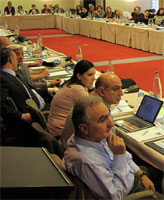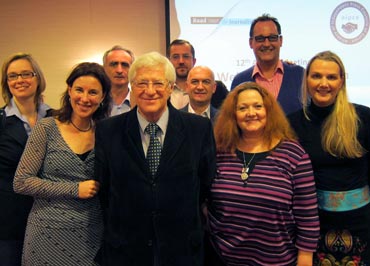South-East European media professionals attended AIPCE meeting with UNESCO’s support
03-12-2010 (Amsterdam)

Meeting in Amsterdam
© UNESCO
For the second time, UNESCO sponsored eight representatives from South-East European countries who participated in the annual meeting of the Alliance of Independent Press Councils of Europe (AIPCE), a European network of independent content regulators for press and broadcast media. The Alliance held its 12th annual meeting in Amsterdam, the Netherlands, from 3 to 6 November 2010.
The participation of the representatives from the South-East European countries was organized and supported by UNESCO in the framework of the project, Alignment to International Standards in the Media Sector of South-East European Countries, in cooperation with Netherlands’s Press Council (Raad voor de Journalistiek). UNESCO’s project aims at encouraging and accelerating media reforms in Albania, Bosnia and Herzegovina, Croatia, Montenegro, Serbia, the former Yugoslav Republic of Macedonia, Turkey and Kosovo (according to UNSCR1244).
Daphne Koene, Secretary General of the Netherland’s Press Council, welcomed the annual meeting as a great opportunity to strengthen the relationships among the European Press Councils in order to contribute to media self-regulation: “The value of well-functioning press councils in general increases almost every day. As a body that can be easily approached by private persons and organizations with complaints about journalistic conduct, the council is pre-eminently suited to deliver self-regulation in the media. And if self-regulation is effective, the credibility of the media will be enhanced, which contributes to a democratic society and to an increase of media freedom.”
On the first day, the conference celebrated the 50th anniversary of the Netherland’s Press Council, which hosted the annual meeting. The second day was spent on reports of Press Councils in different European countries. It was a great opportunity to exchange information of different countries with different situations, which vary tremendously between countries.
The speakers discussed several challenges they are faced with new media. Ella Wassink explained that the German Press Council only deals with complaints on pre-moderated platforms. According to the German Press Council, the platforms that offer comments without any moderation or with post-moderation only, are not considered as journalism but rather a pin board, where no journalistic activity is involved.
Will Gore, Public Affairs Director of the UK Press Complaints Commission (PCC), clarified some decisions of PCC on privacy, public interest and social networking. According to PCC, social networks are a legitimate journalistic tool, but its utilization must be regulated.
Antigoni Themistokleous, PhD student at the University of Brighton, described the challenge of media literacy initiatives accomplishing information literacy. He considers policy makers and educators having a crucial role to play in order to offer education, employment, equal communication opportunities and digital skills for socially and technologically excluded persons.
Jacob Mollerup, President of the Organization of News Ombudsmen (ONO), emphasized that both news ombudsmen and press councils are part of the media accountability system, and that all parts of this system are needed.
Finally Dalia Dorner, Judge and President of the Israel Press Council, stated that it applies not just to a single person’s right to publish ideas, but also to the rights of print and broadcast media to express political views and to cover and publish news. A free press is one of the foundations of a democratic society. Therefore journalists have special responsibilities, such as practising ethical journalism.
The UNESCO project intends to connect the existing press councils and media professionals who work on the creation of press councils in the targeted countries, in cooperation with organizations that deal with self-regulation processes at the European level. The participation in the annual meeting of AIPCE contributed to this goal, enabling the representatives from South-East European countries to get first hand information and share experience with their colleagues on development of media self-regulation in their respective countries.
Daphne Koene, Secretary General of the Netherland’s Press Council, welcomed the annual meeting as a great opportunity to strengthen the relationships among the European Press Councils in order to contribute to media self-regulation: “The value of well-functioning press councils in general increases almost every day. As a body that can be easily approached by private persons and organizations with complaints about journalistic conduct, the council is pre-eminently suited to deliver self-regulation in the media. And if self-regulation is effective, the credibility of the media will be enhanced, which contributes to a democratic society and to an increase of media freedom.”
On the first day, the conference celebrated the 50th anniversary of the Netherland’s Press Council, which hosted the annual meeting. The second day was spent on reports of Press Councils in different European countries. It was a great opportunity to exchange information of different countries with different situations, which vary tremendously between countries.
The speakers discussed several challenges they are faced with new media. Ella Wassink explained that the German Press Council only deals with complaints on pre-moderated platforms. According to the German Press Council, the platforms that offer comments without any moderation or with post-moderation only, are not considered as journalism but rather a pin board, where no journalistic activity is involved.
Will Gore, Public Affairs Director of the UK Press Complaints Commission (PCC), clarified some decisions of PCC on privacy, public interest and social networking. According to PCC, social networks are a legitimate journalistic tool, but its utilization must be regulated.
Antigoni Themistokleous, PhD student at the University of Brighton, described the challenge of media literacy initiatives accomplishing information literacy. He considers policy makers and educators having a crucial role to play in order to offer education, employment, equal communication opportunities and digital skills for socially and technologically excluded persons.
Jacob Mollerup, President of the Organization of News Ombudsmen (ONO), emphasized that both news ombudsmen and press councils are part of the media accountability system, and that all parts of this system are needed.
Finally Dalia Dorner, Judge and President of the Israel Press Council, stated that it applies not just to a single person’s right to publish ideas, but also to the rights of print and broadcast media to express political views and to cover and publish news. A free press is one of the foundations of a democratic society. Therefore journalists have special responsibilities, such as practising ethical journalism.
The UNESCO project intends to connect the existing press councils and media professionals who work on the creation of press councils in the targeted countries, in cooperation with organizations that deal with self-regulation processes at the European level. The participation in the annual meeting of AIPCE contributed to this goal, enabling the representatives from South-East European countries to get first hand information and share experience with their colleagues on development of media self-regulation in their respective countries.
 UNESCO project coordinators (left to right): Tarja Turtia, Daphne Koene, Remzi Lani, Stjepan Malovic, Ognian Zlatev, Yavuz Baydar, Ljiljana Zurovac, Willem Houwen and Adeline Hulin
UNESCO project coordinators (left to right): Tarja Turtia, Daphne Koene, Remzi Lani, Stjepan Malovic, Ognian Zlatev, Yavuz Baydar, Ljiljana Zurovac, Willem Houwen and Adeline Hulin© UNESCO
Related themes/countries
· Europe and North America
· Netherlands
· Professional Journalistic Standards in Europe
Share this story:
Contact information
- UNESCO
Source














